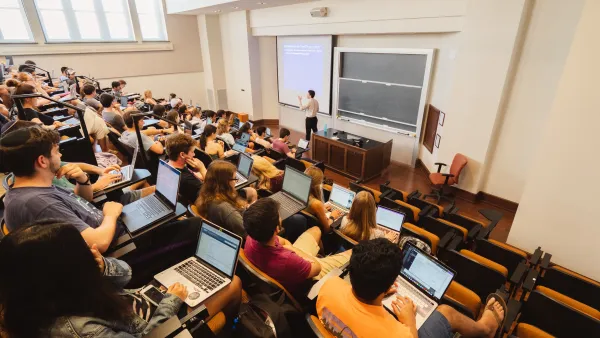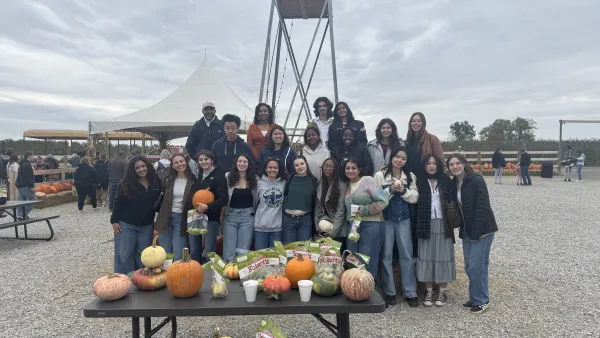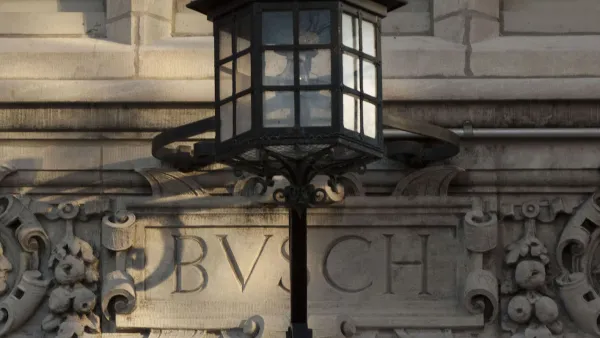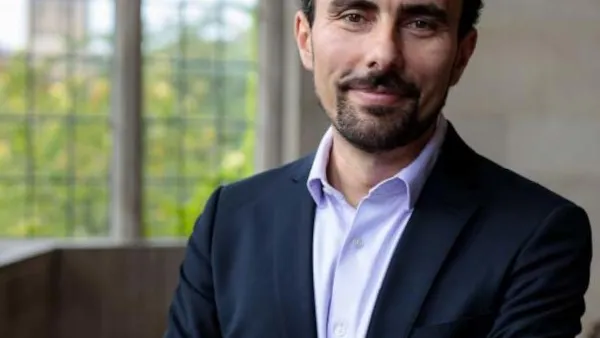An expert on energy policy in the Middle East, Elai Rettig is the Israel Institute Teaching Fellow in Environmental Studies and Jewish, Islamic, and Middle Eastern Studies at WashU. Throughout his career, he has balanced policy work against academic research, conducting research for the Israeli Ministry of Energy and the Israeli Institute for National Security Studies as well as teaching at universities in Israel and the U.S.
We sat down with Rettig to learn more about his approach to training the next generation of public policy workers at WashU.
How do you go about preparing students to work in public policy?
I'm interested in bridging the gap between academia and policy. I want to help students find ways to take knowledge of a region, people, or culture and the complex processes involved in them and then apply it to real life, whether that's by working in public policy, in think tanks, or in the foreign service. Students in JIMES are uniquely prepared to work in these areas because they not only know about the politics but they also get the language of the place, the culture of the place, and the literature of the place. Even if you consider the "other side" as the enemy, if you want to know how to work or contend with other cultures you need to understand them, even love them.
Students have to really dive-in to all sides of the issues they're writing about, because if they just think that they're right and the other side is wrong, if they can't properly advocate for both sides, then they don't really understand the issue properly. They can't really move forward because they write policy papers without really understanding the complexities at play. Policymakers look at these papers and say, okay, obviously he doesn't really understand what my concerns are or what my constraints are or the interest groups that are working here that are making it difficult for me. And so he just throws the policy paper in the trash. It’s only if you can understand the interests and dilemmas of the recipient of your paper that you can actually make a change.
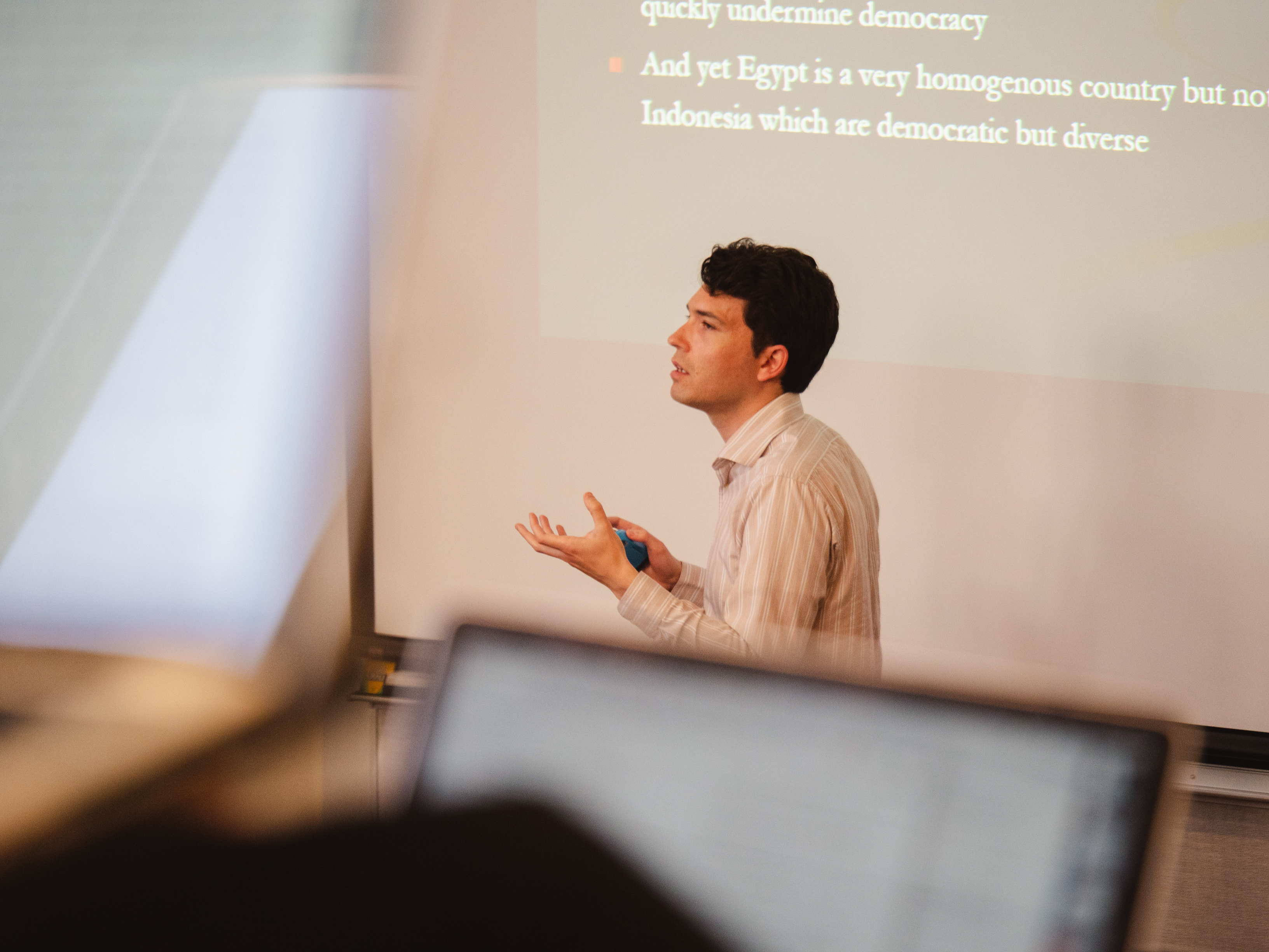
Your appointment is shared between the Environmental Studies Program and the Department of Jewish, Islamic, and Middle Eastern Studies. How does your cross-disciplinary background influence the courses you offer?
Environmental politics and the Middle East go hand-in-hand. On the one end, I teach courses on energy politics, the energy market, how countries shape their foreign policy according to their need to either import or export oil and gas resources. Students attending these courses examine why countries find it so difficult to move towards renewables, why they find it so difficult to implement climate change agreements, and the role that the Middle East plays in these dynamics. I encourage students not to treat fossil fuels as the devil and to instead understand why fossil fuels are so attractive and why is it so hard to stop being addicted to them. It’s important also to understand the problems facing renewable sources of energy and face the steep challenges with open eyes.
On the other end, I also give two courses strictly about the politics of the Middle East. One is about Israeli foreign policy, understanding Israel's perspective of why it does what it does. Whether you agree with those policies or not, you need to understand their perspective and their concerns. The other course is about democracies and dictatorships in the Middle East and how energy politics play into that. We ask questions like why are dictatorships so appealing? Why is it so hard to change a regime? How do dictators preserve their power? How do they deal with other countries? Every lesson we look at the theories regarding regime types as well as case studies about different countries in the region.
By the end of the course students realize that the Middle East is not one cohesive thing. It's a diverse set of countries, and each one of them has a completely different mindset, culture, and set of interests. Let’s say a student graduates and interviews for a job at a D.C. think tank and is asked, what do you think about the situation in the Middle East? The student who went through these courses will say: “what do you mean? Which country are you talking about? Tunisia? Libya? Saudi Arabia?” Automatically he has a step up above anyone else because he actually understands that Arab culture is not monolithic, just like there's no such thing as one Western culture.
The skills and values that you gain in academia—the importance of accuracy, of not just throwing numbers, of backing your arguments with references—are critical when you're a practitioner or when you are advising practitioners.
Your grant also provides funds for bringing speakers to campus. What do you hope students will gain from these visits?
I want to bring in decision makers, people with practical experience who were at the center of events and can talk not just from an academic point of view but from a practitioner's perspective. Meeting these speakers gives our students the opportunity to see theoretical knowledge in practice. For example, one of the speakers I brought during the Spring semester was a career officer in the Israeli Defense Forces during the first Intifada. He was the deputy director of AMAN, the Intelligence Directorate in the military which is one of the most important and technologically advanced part of the IDF. He was also a military liaison to the peace talks between Israel and Egypt and between Israel and Jordan. I asked him to come here, not to give a history lesson, but to talk about what's currently going on between Israel and Hamas, to explore the complexities of this conflict and why it's seemingly just repeated rounds of violence without any conclusion.
What has your experience been like working with the students at WashU?
What’s amazing here at WashU and in JIMES is that the students have incredible language skills, and they're interested in going beyond superficial readings of news reports. They actually read primary sources, speeches, and archival material. They actually know how to access primary sources, including in non-English media, archives, and government reports. The written assignments that I get from these students are just one level above because they get access to data that other people don't have access to.
If you just know one language then you are kind of limited. You don't really get data, you get processed data. You get opinion. Someone else has had access to data, processed it, and shown it to you to his best understanding. You don't really have access to the primary sources that allow you to make your own assessment. The students I’ve taught at WashU have access to more data because of their language training. It makes them not only better researchers but also prepares them to be better policy makers, reformers, and analysts in the future.
That linguistic flexibility seems particularly important in our current moment, with discussion about truth and journalism.
I’m hoping that students in my courses realize that everything is a little more complex than how they see things on the news. In my courses I give this assignment where students take a news article from The New York Times or The Washington Post and criticize it and see what the report isn't really reporting. Established papers rarely give data that's outright wrong. But due to editorial concerns or the constraints of who they have access to, journalists can end up giving readers a partial representation of the story, one that might not put events in a larger context. So the students' job is to take that article and either criticize it or put it in a context that better explains it.
Especially in my energy courses, students realize that even if they read about something in the best financial newspapers like The Wall Street Journal or The Financial Times, they keep finding mistakes or misrepresentation of things. They realize that at the end of the day journalists are people too, with limited resources and time.
You conducted research previously as a scholarship recipient for the Department of Energy and also as a policy researcher at the Institute for National Security in Israel. Can you tell me a little bit more about your own work as a practitioner?
It's not as different as you would think from academic research. It's different in the sense that it needs to lead to policy recommendations. The skills and values that you gain in academia—the importance of accuracy, of not just throwing numbers, of backing your arguments with references—are critical when you're a practitioner or when you are advising practitioners. You're not just writing to your peers or to an academic journal. You want people to act on what you're doing. So you need to be really responsible and make sure that you're giving accurate and current information from reliable sources. You also need to make sure that the information you’re drawing from a previous case study has the same attributes and the same application to the current situation.
You feel like there is much more responsibility on you because you understand that the people who are reading what you're writing may actually act upon it. It's exhilarating. You feel like it's actually making a difference, whether it is or is not. You also feel the responsibility. That's why it's so important that practitioners and people that make these recommendations have this academic background. You may never use your knowledge about medieval cultures in South East Asia explicitly, but through writing about that history you learn how to access sources and construct an argument. You learn how to back up your ideas with credible sources. Basically you learn how to properly read and write, and how to read between the lines and understand context.
